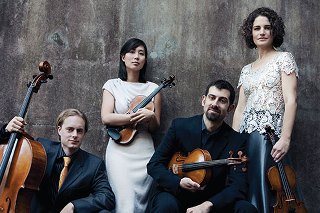|
Back
Stringing In The Rain New York
Grace Rainey Rogers Auditorum
10/02/2015 -
Johannes Brahms: String Quartets No. 1 in C Minor, Opus 51, No. 1, No. 2 in A Minor, Opus 51, No. 2, & No. 3 in B flat Major, Opus 67
Chiara String Quartet: Rebecca Fischer, Hyeyung Julie Yoon (Violins), Jonah Sirota (Viola), Gregory Beaver (Cello)

Chiara Quartet (© Lisa-Marie Mazzucco)
Johannes Brahms’ three string quartets could hardly palliate the effects of a drenched, and soggy, windy, dripping New York night. But I can’t think of any chamber music (oh, perhaps some of the early Schubert quartets) that would offer the requisite musical sunshine. And certainly appropriate that their venue was the Grace Rainey Rogers Auditorium.
Perhaps only the name of the performers–Chiara, meaning lucent, transparent–could assuage God’s rainy torture on us New Yorkers.
The three Brahms quartets, though are not supposed to be t radiant, except to the players. To this non-string player, they are dark, mysterious, constructed not with the emotion of the symphonies or the bravura of the concertos or even the poetry of the songs. They can be a spider-web of counterpoint, countervailing rhythms, and (as Arnold Schoenberg affirmed) a portal to the most complex 20th Century music.
Add to this, the night before the Chiara String Quartet opened their artist-in-residence stint with the Met Museum of Art, Emanuel Ax and Alan Gilbert had plunged their talents into more amenable Brahms, the Tragic Overture and the Second Concerto.
Still, one must admire the four players here, all Juilliard comrades who have performed together for over a decade. The last time I heard them was in a church, where the program was fascinating. First a string quartet by Richard Danielpour, and then Tryptych by the eminent Robert Sirota (who happens to be the violist’s father).
They have stayed together not only by being prime musicians, but having (and they will probably hate me for saying this) their own shtick. Like the Orpheus Chamber Orchestra without a conductor, these four memorize their music and play without scores.
When Arturo Toscanini conducted without a score, everybody thought it was genius! (The reality was that he was too vain to wear the spectacles which he needed.) Chiara plays scoreless because, as Jonah Sirota writes, “it somehow freed our minds to express and share with each other the characters that the music brought to life in our imaginations.”
And it makes them unique in a world packed with proficient string quartets.
The group certainly made a great impression. Though one felt guilty if the mind wandered at times through the dense underbrush of their notes. My own favorite came with the opening Second String Quartet,fearfully dense, and played with requisite care and control. One felt that had the Chiara been more spontaneous here, the whole thing might have swung out of control.
One could see why Schoenberg (as well as chamber players) love this music. But frankly, I was happy to be relieved of the pain with a delicious finale, which seemed part Hungarian dance, partly Austrian waltz.
The Third Quartet in the center of the concert, was equally difficult, very classical, the successful composer daring players and audience to decipher his cryptic innermost thoughts (yes á la Beethoven). The opening was buoyant, moody enough (with some lovely melodies by Ms. Fischer). And I was stunned by the slow second movement, with its surprising “Amen” at the finish.
During the intermission, a fair amount of people left, hopefully (I prayed) because they were seduced by the Egyptian exhibition adjacent to the concert hall. It is magical.
The Brahms First Quartet doesn’t have that same magic, but after 20 attempts at quartet-writing, with a wastebasket filled with years and years of rejected notes, the composer finally got it right. The Chiara got it right as well. That is, if one accepts the moodiness, the lines tangled up like a four-stranded DNA helix.
So no, this was not cheery music, this did not call for a "Huzzah”, “Hats off, Gentleman!” that one heard for Mr. Ax and the Concerto. What the Chiara did was disturbing, challenging, not always with rapier-accuracy but certainly with personal commitment.
Harry Rolnick
|